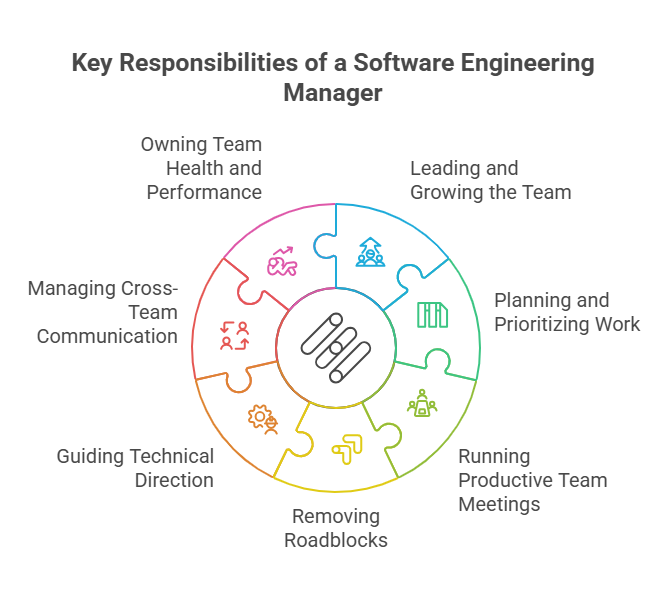A Software Engineering Manager doesn’t just write code, they build teams, guide projects, and help engineers do their best work. This role blends technical understanding with people leadership.
As companies scale, the need for strong engineering managers grows. They’re the link between business goals and the people building the product. Whether you’re an engineer thinking about the next step or someone trying to understand what this role involves, knowing what an Engineering Manager actually does can help you make smarter career and hiring decisions.
In this guide, we’ll discuss the key responsibilities, day-to-day work, and skills that define a great Engineering Manager without the fluff.
Role Overview: The Bridge Between Engineering and Leadership
Software Engineering Managers connect people and projects. They lead engineering teams, guide execution, and ensure that technical work supports business goals. Their role blends leadership with just enough technical insight to keep everything on track.
Definition and Core Purpose of the Role
A Software Engineering Manager (EM) leads a team of engineers and ensures their work aligns with business goals. They’re responsible for both people and project success. While they may still understand the technical side, their main job is to help the team deliver clearly, efficiently, and consistently.
They guide engineers, remove blockers, and keep the team focused. Unlike Tech Leads, who often stay hands-on with code and architecture, EMs spend more time on hiring, team structure, planning, and communication. Tech Leads solve technical problems; EMs solve team problems.
Project Managers, on the other hand, handle timelines, budgets, and coordination across departments. While EMs often work closely with them, they focus more on technical leadership, team health, and delivery quality.
An EM’s impact isn’t measured by the code they write, but by the growth of their team and the reliability of their results.
Typical Job Titles and Where the Role Fits in the Org Chart
Common titles include Engineering Manager, Software Development Manager, Technical Manager, and Platform Manager. The titles may vary by company, but the core responsibilities are usually the same—leading engineers and delivering results.
Most EMs report to a Director of Engineering or CTO. In some cases, they may also work under a VP of Engineering, especially in larger organizations. They’re often the first layer of leadership above individual contributors, acting as the direct manager for software engineers, QA engineers, or cross-functional teams.
In startups, an EM might manage a small team of 3–5 people and wear multiple hats. In larger companies, they may lead teams of 8–15 engineers, often focused on a specific domain like frontend, infrastructure, or data. As the team size grows, EMs typically focus more on strategy and scaling systems rather than individual project details.
Day-to-Day Responsibilities of a Software Engineering Manager
Engineering Managers don’t just manage—they lead, coach, plan, and solve problems. Their job is to create an environment where engineers can focus, grow, and deliver great work. Below are seven key responsibilities that shape how they do it every day.

1. Leading and Growing the Team
EMs hire, onboard, and support engineers at every stage. They run one-on-ones, give feedback, and create growth plans. Their goal is to build a team that’s skilled, motivated, and constantly improving.
2. Planning and Prioritizing Work
They work with Product and Design to plan features, break down work, and decide what gets done first. They balance deadlines with technical effort, making sure projects move forward without burning out the team.
3. Running Productive Team Meetings
EMs lead stand-ups, sprint planning, and retrospectives. These meetings aren’t just rituals—they’re how the team stays aligned, clears up confusion, and improves how they work.
4. Removing Roadblocks
When things get stuck, EMs step in. Whether it’s unclear requirements, team conflicts, or slow decision-making, they fix what’s slowing the team down so engineers can focus on building.
5. Guiding Technical Direction (Without Micromanaging)
They stay close enough to technical work to offer input but trust Tech Leads for deeper decisions. They make sure the team builds clean, stable systems and doesn’t cut corners just to ship faster.
6. Managing Cross-Team Communication
EMs are the bridge between engineering and other departments. They translate business needs into technical plans and explain engineering priorities to stakeholders.
7. Owning Team Health and Performance
They watch for signs of burnout, conflict, or underperformance and take action early. They protect the team’s time, create a strong culture, and make sure everyone is set up to succeed.
Essential Skills and Traits for Success
To lead well, Software Engineering Managers need more than technical know-how. They need a balanced set of people, planning, and decision-making skills. Here are five traits that make the biggest difference in the role.
1. Clear Communication
Great managers say what needs to be said—early, directly, and with context. They simplify goals, explain trade-offs, and make sure everyone’s on the same page, inside and outside the team.
2. People-First Leadership
They care about how people work together. That means giving feedback, resolving tension, and making space for growth. They don’t avoid hard conversations—they handle them with clarity and respect.
3. Technical Awareness
They don’t need to code every day, but they should understand the work well enough to guide it. They ask smart questions, weigh risks, and back decisions with context, not guesswork.
4. Prioritization and Focus
There’s always more work than time. EMs must help the team focus on what matters most. They cut distractions, set clear goals, and adjust plans when needed without slowing momentum.
5. Follow-Through
They follow up. Whether it’s a hiring decision, a blocker, or a missed deadline, they don’t let things slide. Teams trust managers who do what they say and finish what they start.
How the Role Evolves With Experience
The role of a Software Engineering Manager changes as you grow. Early on, you’re close to the work—reviewing code, running stand-ups, and helping your team deliver. Over time, the focus shifts from daily execution to long-term impact.
From Engineer to EM: What Changes
The biggest shift is mindset. As an engineer, your success is measured by what you build. As a manager, it’s about what your team delivers and how well they work together. You step back from coding and focus more on planning, hiring, and supporting others.
You also start thinking about systems—how decisions get made, how work flows, and how to scale team practices as things grow.
Growth Beyond the First Team
As you gain experience, you may lead multiple teams or manage other managers. The problems change. You spend less time solving bugs and more time shaping strategy, aligning teams, and improving cross-functional work.
You may grow into roles like Senior Engineering Manager, Director of Engineering, or VP. Each step adds more scope, more people, and more responsibility.
Some EMs stay close to the team and keep a hands-on style. Others move up and focus on org-wide planning. There’s no single path—it depends on your strengths, goals, and the needs of the company.
Common Challenges and How to Navigate Them
Being a Software Engineering Manager comes with its own set of challenges. You deal with people, pressure, and unpredictable problems. Knowing what to expect—and how to respond—can make the role smoother and more effective.
1. Handling Underperformance
It’s never easy to manage low performance, but ignoring it hurts the whole team. Good EMs address it early, giving clear feedback, setting expectations, and offering support. If things don’t improve, they make tough decisions quickly and fairly.
2. Balancing Tech and Management
One common trap is trying to stay too hands-on with code. At some point, you can’t do both well. The shift is learning to trust your team and technical leads, while still staying informed enough to guide direction and ask smart questions.
3. Managing Conflicts
Team conflict slows down progress and damages morale. EMs don’t avoid it—they step in, listen, and get to the root of the issue. They work with people to find solutions that keep the team moving forward.
4. Dealing With Ambiguity
Priorities shift, plans change, and sometimes answers aren’t clear. Instead of freezing, strong managers bring clarity. They break problems into steps, focus on what they do know, and keep momentum going.
5. Preventing Burnout
Engineering teams can push hard, but not forever. A good EM watches for signs of burnout, sets healthy boundaries, and leads by example. They don’t reward long hours—they reward smart work, consistent output, and balance.
Tips for Aspiring Engineering Managers
If you’re thinking about becoming a Software Engineering Manager, start by building the habits that strong leaders rely on. You don’t need a title to lead—many of these skills can be practiced right now.
1. Look for Leadership Opportunities in Your Current Role
Take ownership of tasks, help newer engineers, or lead small projects. These experiences show you how to guide others and get work done through the team, not just by yourself.
2. Focus on Communication, Not Control
Great managers don’t give orders—they create clarity. Practice explaining decisions, giving feedback, and asking questions that unlock better thinking. The better you communicate, the better your team will function.
3. Learn From Your Manager
Watch how your current EM works—what they do well and where they struggle. Ask questions, take notes, and request feedback on your own leadership style. You’ll learn what works and what doesn’t, faster than you think.
4. Shift Your Mindset From “Doing” to “Enabling”
Your job as a future manager isn’t to solve every problem—it’s to help others solve problems well. Let go of the need to be the smartest person in the room. Focus on helping others succeed.
5. Don’t Wait for Permission to Grow
Read about leadership, ask for stretch assignments, and talk to your manager about your interest in the EM path. Show you’re serious, and you’ll start getting chances to lead before the title ever arrives.
Conclusion
The best Engineering Managers don’t become great by accident—they build themselves deliberately. They stay curious, ask hard questions, and invest in people as much as they do in systems. Whether you’re aiming for the role or already in it, your growth depends on how well you listen, how clearly you communicate, and how consistently you follow through.
If you’re serious about stepping into leadership, don’t just study the role—start practicing it. Offer help without being asked. Speak up when something needs to improve. Build trust one action at a time. The title may come later, but the impact starts now.
Remember, being an Engineering Manager isn’t about having all the answers—it’s about building a team that can find them together.




